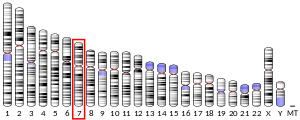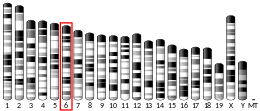MRPS33
28S ribosomal protein S33, mitochondrial is a protein that in humans is encoded by the MRPS33 gene.[5][6][7]
Mammalian mitochondrial ribosomal proteins are encoded by nuclear genes and help in protein synthesis within the mitochondrion. Mitochondrial ribosomes (mitoribosomes) consist of a small 28S subunit and a large 39S subunit. They have an estimated 75% protein to rRNA composition compared to prokaryotic ribosomes, where this ratio is reversed. Another difference between mammalian mitoribosomes and prokaryotic ribosomes is that the latter contain a 5S rRNA. Among different species, the proteins comprising the mitoribosome differ greatly in sequence, and sometimes in biochemical properties, which prevents easy recognition by sequence homology. The 28S subunit of the mammalian mitoribosome may play a crucial and characteristic role in translation initiation. This gene encodes a 28S subunit protein that is one of the more highly conserved mitochondrial ribosomal proteins among mammals, Drosophila and Caenorhabditis elegans. Splice variants that differ in the 5' UTR have been found for this gene; all variants encode the same protein. Pseudogenes corresponding to this gene are found on chromosomes 1q, 4p, 4q, and 20q[7]
References
- GRCh38: Ensembl release 89: ENSG00000090263 - Ensembl, May 2017
- GRCm38: Ensembl release 89: ENSMUSG00000029918 - Ensembl, May 2017
- "Human PubMed Reference:". National Center for Biotechnology Information, U.S. National Library of Medicine.
- "Mouse PubMed Reference:". National Center for Biotechnology Information, U.S. National Library of Medicine.
- Cavdar Koc E, Burkhart W, Blackburn K, Moseley A, Spremulli LL (May 2001). "The small subunit of the mammalian mitochondrial ribosome. Identification of the full complement of ribosomal proteins present". J Biol Chem. 276 (22): 19363–74. doi:10.1074/jbc.M100727200. PMID 11279123.
- Lai CH, Chou CY, Ch'ang LY, Liu CS, Lin W (Aug 2000). "Identification of novel human genes evolutionarily conserved in Caenorhabditis elegans by comparative proteomics". Genome Res. 10 (5): 703–13. doi:10.1101/gr.10.5.703. PMC 310876. PMID 10810093.
- "Entrez Gene: MRPS33 mitochondrial ribosomal protein S33".
Further reading
- Gerhard DS, Wagner L, Feingold EA, et al. (2004). "The status, quality, and expansion of the NIH full-length cDNA project: the Mammalian Gene Collection (MGC)". Genome Res. 14 (10B): 2121–7. doi:10.1101/gr.2596504. PMC 528928. PMID 15489334.
- Hillier LW, Fulton RS, Fulton LA, et al. (2003). "The DNA sequence of human chromosome 7". Nature. 424 (6945): 157–64. doi:10.1038/nature01782. PMID 12853948.
- Zhang Z, Gerstein M (2003). "Identification and characterization of over 100 mitochondrial ribosomal protein pseudogenes in the human genome". Genomics. 81 (5): 468–80. doi:10.1016/S0888-7543(03)00004-1. PMID 12706105.
- Scherer SW, Cheung J, MacDonald JR, et al. (2003). "Human chromosome 7: DNA sequence and biology". Science. 300 (5620): 767–72. doi:10.1126/science.1083423. PMC 2882961. PMID 12690205.
- Strausberg RL, Feingold EA, Grouse LH, et al. (2003). "Generation and initial analysis of more than 15,000 full-length human and mouse cDNA sequences". Proc. Natl. Acad. Sci. U.S.A. 99 (26): 16899–903. doi:10.1073/pnas.242603899. PMC 139241. PMID 12477932.
- Sanger Centre, The; Washington University Genome Sequencing Cente, The (1999). "Toward a complete human genome sequence". Genome Res. 8 (11): 1097–108. doi:10.1101/gr.8.11.1097. PMID 9847074.




